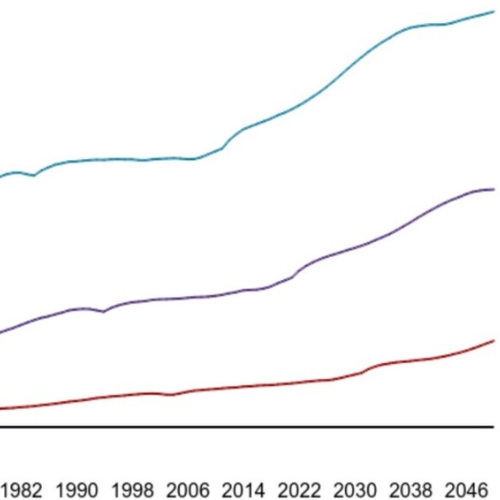In the bustling streets and serene landscapes of the United Kingdom, a silent crisis has been brewing. Unhealthy diets, brimming with processed foods and sugary drinks, have long cast a shadow over the nation's health. With more than 75,000 premature deaths annually linked to poor eating habits, the urgency to pivot towards healthier choices has never been more pressing. This is not just a matter of personal well-being; it's a public health imperative that resonates with the global goal of reducing mortality from non-communicable diseases.
A Deep Dive into Dietary Impact
Enter the groundbreaking research published in Nature Food in November 2023. Utilising the extensive database of the UK Biobank, the study illuminates a path forward, examining how sustained shifts towards healthier diets can significantly enhance life expectancy. This research is not just another echo in the chamber of nutritional science; it is a clarion call for change, backed by robust data and compelling evidence.
The study dissected dietary patterns, scrutinising the long-term effects of transitioning from unhealthy diets to those aligned with the Eatwell Guide recommendations. The Eatwell Guide, a beacon of balanced eating, emphasises whole grains, fruits, nuts, and a reduction in processed meats and sugary beverages. The researchers didn't just skim the surface; they delved into how these dietary shifts could rewrite the script of life expectancy.
The findings were nothing short of astonishing. The core finding is a testament to the power of dietary transformation. For individuals at the age of 40, the study reveals that a sustained shift from unhealthy dietary habits to those recommended by the Eatwell Guide – a model of balanced eating emphasising whole grains, fruits, nuts, and fewer processed meats and sugary beverages – could yield significant increases in life expectancy. Specifically, the research indicates an increase of approximately 8.9 years for males and 8.6 years for females. This statistic is more than a mere number; it represents a potential reshaping of an individual's lifespan through dietary choices.
But the study delves deeper. It also investigates the effects of adopting longevity-associated dietary patterns, a concept that goes beyond standard healthy eating guidelines. This approach looks at dietary patterns commonly found in populations with notably high life expectancies. The findings here are even more striking. For the same demographic, adopting these longevity-associated diets could lead to an increase of 10.8 years in life expectancy for males and 10.4 years for females. These results underscore the substantial impact that dietary choices can have, not just in adding years to life, but also in potentially enhancing the quality of those additional years.
Moreover, the study sheds light on specific dietary changes that contribute most significantly to this increase in life expectancy. It highlights the benefits of consuming more whole grains, nuts, and fruits, and reducing intake of sugar-sweetened beverages and processed meats. These dietary adjustments are not just about abstaining from certain foods but are more about embracing a balanced and nutritious dietary regime.
These findings are pivotal in demonstrating that dietary changes made in midlife can still have a substantial impact on life expectancy. This challenges the often-held notion that dietary habits, once formed, are too late to change in order to reap significant health benefits.
From Research to Reality
The research presents not just a scientific inquiry but a societal imperative, highlighting the critical role of diet in determining life expectancy and overall public health.
Shaping Public Health Policy
One of the most significant implications of this research is its potential influence on public health policy. Governments and health organisations are constantly seeking effective strategies to improve population health and reduce the burden of non-communicable diseases. The findings from this study provide compelling evidence to support policies that promote healthier diets. By incorporating these insights, policymakers can develop more targeted and effective dietary guidelines, public health campaigns, and educational programmes that advocate for the consumption of whole grains, fruits, nuts, and a reduction in processed and sugary foods.
Furthermore, this research could influence policy decisions regarding food production, distribution, and labelling. For example, incentives for producers to create healthier food options, clearer nutritional information on packaging, and even taxation policies on sugary drinks and processed meats could be informed by these findings. Essentially, this study arms policymakers with the data needed to make informed decisions that could transform the health landscape of the nation.
Empowering Individuals
On an individual level, the study serves as a powerful reminder of the control we have over our own health destinies. It underscores the fact that even changes made in midlife can significantly impact life expectancy and quality of life. This knowledge empowers individuals to make more informed decisions about their diets, understanding that these choices can have a profound effect on their longevity and well-being.
This research could also motivate healthcare providers to emphasize the importance of dietary changes in their interactions with patients. By incorporating dietary advice into routine health care, medical professionals can play a pivotal role in guiding individuals towards healthier eating habits.
Social and Economic Considerations
The study's implications also extend to the broader socio-economic context. Healthier populations mean reduced healthcare costs and a lesser burden on healthcare systems. By reducing the prevalence of diet-related non-communicable diseases, there could be substantial savings in healthcare expenditures, which can be redirected to other critical areas of public health.
Moreover, this research can spark a shift in consumer demand, influencing food industries to adapt and provide healthier options. This can lead to a virtuous cycle, where healthier eating becomes more accessible and affordable for a broader segment of the population.
Global Health Perspective
While the study is focused on the UK, its findings have global relevance. Many countries are grappling with similar issues related to diet and health. The insights from this research can be adapted and applied in various international contexts, contributing to global efforts to improve health outcomes and achieve the Sustainable Development Goals related to health and well-being.Credits: The Minds Behind the Discovery
Credits
This research was spearheaded by researchers at the University of Bergen, conducted with the support of his colleagues, and based on the extensive data from the UK Biobank. The study was published in Nature Food, marking a significant contribution to nutritional science and public health understanding. This work stands as a testament to the power of collaborative research in unveiling the keys to a healthier, longer life.







